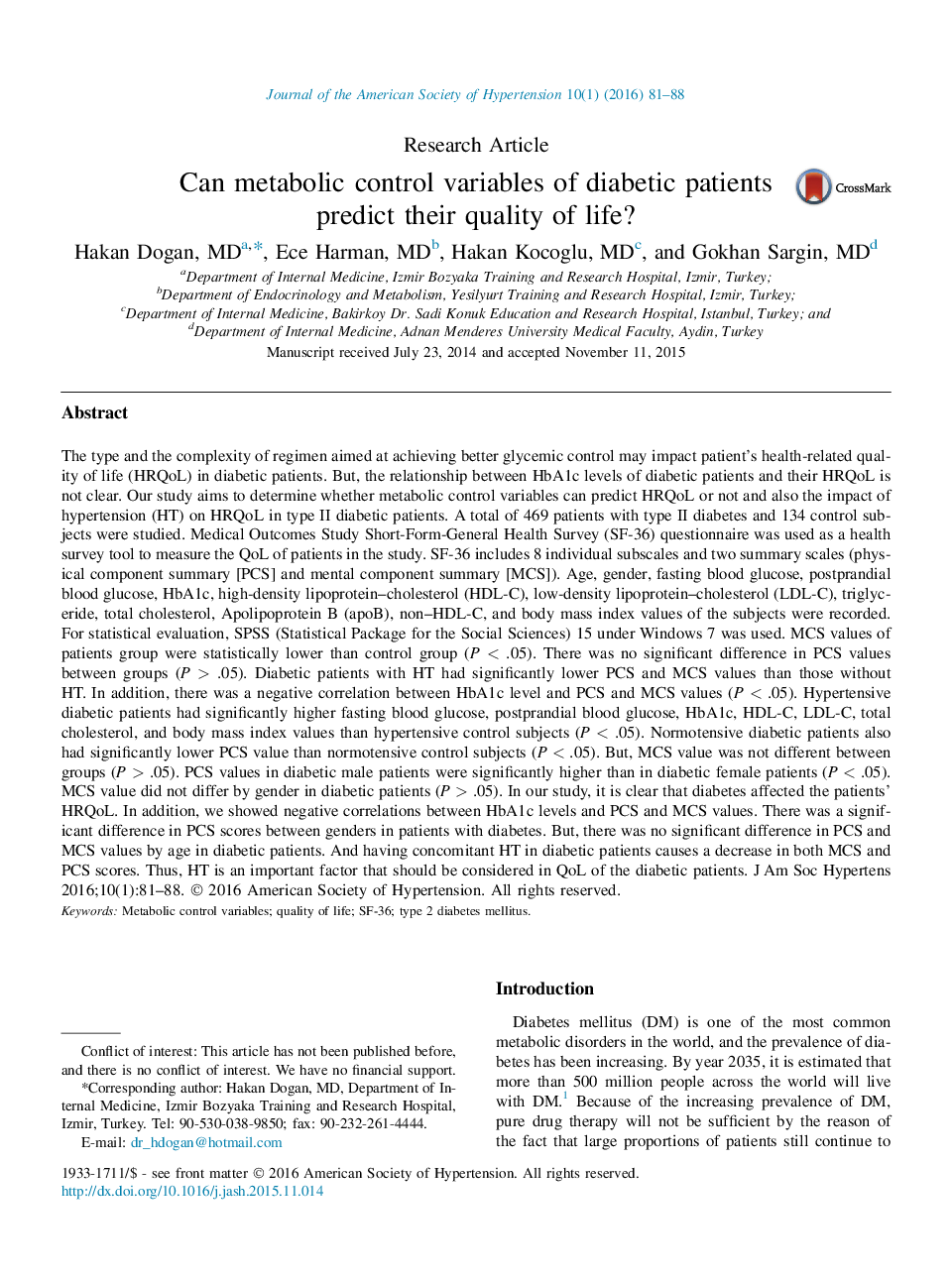| کد مقاله | کد نشریه | سال انتشار | مقاله انگلیسی | نسخه تمام متن |
|---|---|---|---|---|
| 5983612 | 1578029 | 2016 | 8 صفحه PDF | دانلود رایگان |
- It is clear that diabetes affects the patients' health-related quality of life.
- Negative correlations were determined between HbA1c levels and physical component summary (PCS) and mental component summary (MCS) values.
- There was no significant difference in PCS and MCS values by age in diabetic patients.
- There was a significant difference in PCS scores between genders in patients with diabetes.
- Having concomitant hypertension in diabetic patients causes a decrease in both MCS and PCS scores. Thus, hypertension is an important factor that should be considered in quality of life of the diabetic patients.
The type and the complexity of regimen aimed at achieving better glycemic control may impact patient's health-related quality of life (HRQoL) in diabetic patients. But, the relationship between HbA1c levels of diabetic patients and their HRQoL is not clear. Our study aims to determine whether metabolic control variables can predict HRQoL or not and also the impact of hypertension (HT) on HRQoL in type II diabetic patients. A total of 469 patients with type II diabetes and 134 control subjects were studied. Medical Outcomes Study Short-Form-General Health Survey (SF-36) questionnaire was used as a health survey tool to measure the QoL of patients in the study. SF-36 includes 8 individual subscales and two summary scales (physical component summary [PCS] and mental component summary [MCS]). Age, gender, fasting blood glucose, postprandial blood glucose, HbA1c, high-density lipoprotein-cholesterol (HDL-C), low-density lipoprotein-cholesterol (LDL-C), triglyceride, total cholesterol, Apolipoprotein B (apoB), non-HDL-C, and body mass index values of the subjects were recorded. For statistical evaluation, SPSS (Statistical Package for the Social Sciences) 15 under Windows 7 was used. MCS values of patients group were statistically lower than control group (PÂ <Â .05). There was no significant difference in PCS values between groups (PÂ >Â .05). Diabetic patients with HT had significantly lower PCS and MCS values than those without HT. In addition, there was a negative correlation between HbA1c level and PCS and MCS values (PÂ <Â .05). Hypertensive diabetic patients had significantly higher fasting blood glucose, postprandial blood glucose, HbA1c, HDL-C, LDL-C, total cholesterol, and body mass index values than hypertensive control subjects (PÂ <Â .05). Normotensive diabetic patients also had significantly lower PCS value than normotensive control subjects (PÂ <Â .05). But, MCS value was not different between groups (PÂ >Â .05). PCS values in diabetic male patients were significantly higher than in diabetic female patients (PÂ <Â .05). MCS value did not differ by gender in diabetic patients (PÂ >Â .05). In our study, it is clear that diabetes affected the patients' HRQoL. In addition, we showed negative correlations between HbA1c levels and PCS and MCS values. There was a significant difference in PCS scores between genders in patients with diabetes. But, there was no significant difference in PCS and MCS values by age in diabetic patients. And having concomitant HT in diabetic patients causes a decrease in both MCS and PCS scores. Thus, HT is an important factor that should be considered in QoL of the diabetic patients.
Journal: Journal of the American Society of Hypertension - Volume 10, Issue 1, January 2016, Pages 81-88
